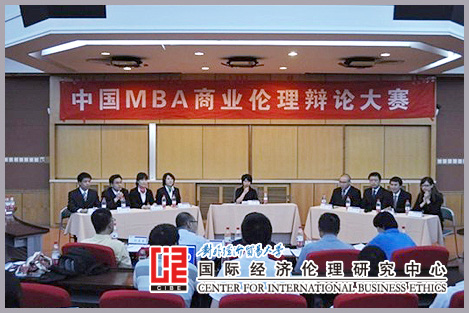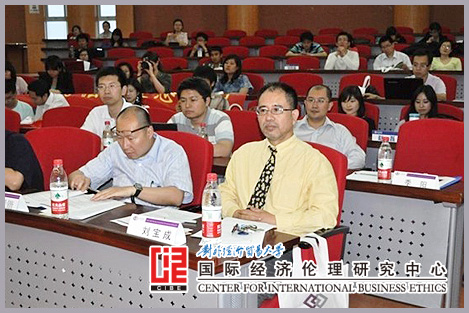On May 25, 2011, CIBE Director Liu Baoch eng served as a competition judge for the first annual China MBA Business Ethics Debate. The competition was organized by the MBA Education Center of the Economic Management School at Tsinghua University as a part of its overall mission to strengthen the business school, support the business community, and enhance the relationship and communication between the two. The Debate challenges MBA students to integrate their business and ethical knowledge with their critical-thinking and rhetoric skills in an effort to help raise the larger society’s awareness of important areas of business ethics and then to reshape business ethics systems into ones that are "honest and keep faith, [protect] fair competition, do things based on people, and [are] environment friendly.” eng served as a competition judge for the first annual China MBA Business Ethics Debate. The competition was organized by the MBA Education Center of the Economic Management School at Tsinghua University as a part of its overall mission to strengthen the business school, support the business community, and enhance the relationship and communication between the two. The Debate challenges MBA students to integrate their business and ethical knowledge with their critical-thinking and rhetoric skills in an effort to help raise the larger society’s awareness of important areas of business ethics and then to reshape business ethics systems into ones that are "honest and keep faith, [protect] fair competition, do things based on people, and [are] environment friendly.”
CIBE Director Dr. Liu Baocheng was invited to serve as judge for the semi-finals of the 2011 competition, which was the inaugural debate of what Tsinghua’s MBA Education Center hopes becomes a regular event. The semi-final was divided into two games, the first of which found the People's University of China debating against China University of Political Science and Law about an ethical issue phrased as "whether an operating enterprise should seek legal grey zone or not." Profe ssor Liu gave the game his full attention and insight. He encouraged the players and offered suggestions on how they could further develop the topic, improve their debating skills, and increase the team’s cooperation and chemistry. The second semi-final pitted Peking University against Beijing Normal University over the topic: “as for enterprise leaders, commercial interests or business ethics, which one is more important." Professor Liu gave great praise for the debate and for such a fascinating topic, but offered helpful recommendations on how the debaters could improve the strength of the reasons in support of their positions. For example, he advised both sides about the need for providing supporting references, verifiable key data, and quotations by professional academics. ssor Liu gave the game his full attention and insight. He encouraged the players and offered suggestions on how they could further develop the topic, improve their debating skills, and increase the team’s cooperation and chemistry. The second semi-final pitted Peking University against Beijing Normal University over the topic: “as for enterprise leaders, commercial interests or business ethics, which one is more important." Professor Liu gave great praise for the debate and for such a fascinating topic, but offered helpful recommendations on how the debaters could improve the strength of the reasons in support of their positions. For example, he advised both sides about the need for providing supporting references, verifiable key data, and quotations by professional academics.
Overall, Professor Liu Baocheng thought the competitor’s in both debates exhibited agile thought, sharp language, and white-hot intensity at times. Professor Liu extolled the competition as an opportunity for participants to improve their debating skills and to strengthen the professional knowledge of study. China University of Political Science and Law won the first semi-final and will face Peking University (the winner of the second semi-final) in the final, setting upS a perfect ending to the first China MBA Business Ethics Debate Competition.
|
